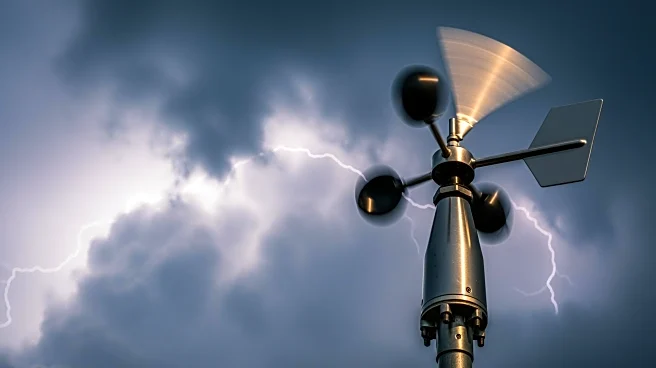What's Happening?
The National Center for Atmospheric Research has confirmed a record-breaking 252 mph wind gust in Hurricane Melissa, marking the highest wind speed ever recorded by dropsondes. These instruments are deployed into hurricanes to gather data. The gust was
recorded as Hurricane Melissa approached Jamaica on October 28, 2025. The storm, classified as a Category 5 hurricane, caused significant damage and loss of life, with at least 90 deaths reported, including 45 in Jamaica. The hurricane also impacted Haiti and the Dominican Republic, resulting in substantial economic damage, estimated at $8.8 billion in Jamaica alone. The confirmation of the wind gust was a collaborative effort between NOAA and the atmospheric research center, ensuring the accuracy of the data collected.
Why It's Important?
The confirmation of the 252 mph wind gust in Hurricane Melissa highlights the increasing intensity of hurricanes in the Atlantic, raising concerns about the potential impacts of climate change on storm behavior. This record-setting gust underscores the importance of accurate data collection for forecasting and preparedness, as extreme weather events pose significant risks to human life and infrastructure. The economic implications are profound, with billions of dollars in damages affecting the Caribbean region. The data collected by dropsondes is crucial for improving hurricane models and forecasts, which can aid in better preparation and response strategies, potentially saving lives and reducing economic losses.
What's Next?
The confirmation of the record wind gust will likely lead to further research into the factors contributing to such extreme weather phenomena. Scientists and engineers at the National Center for Atmospheric Research are expected to continue advancing the technology used in dropsondes to enhance data accuracy and reliability. This development may prompt discussions among policymakers and climate scientists about the need for increased investment in hurricane preparedness and mitigation strategies. Additionally, the findings could influence future climate policy decisions, emphasizing the urgency of addressing climate change and its impact on weather patterns.
Beyond the Headlines
The record wind gust in Hurricane Melissa may have broader implications for understanding the dynamics of hurricanes in the context of climate change. As hurricanes become more intense, there is a growing need to explore the ethical dimensions of disaster response and preparedness, particularly in vulnerable regions. The event highlights the importance of international cooperation in sharing data and resources to improve global resilience against natural disasters. Furthermore, the technological advancements in data collection could lead to long-term shifts in how meteorologists and climate scientists approach hurricane forecasting and risk assessment.
















